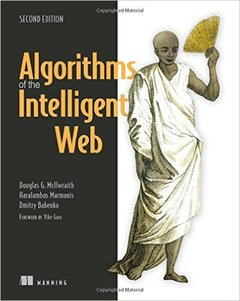Description
Algorithms of the Intelligent Web, Second Edition (2nd Ed.)
Authors: McIlwraith Douglas, Marmanis Haralambos, Babenko Dmitry
Language: English
Subjects for Algorithms of the Intelligent Web, Second Edition:
46.08 €
In Print (Delivery period: 14 days).
Add to cart222 p. · 19x23.5 cm · Paperback
Description
/li>Biography
/li>
There's priceless insight trapped in the flood of data users leave behind as they interact with web pages and applications. Those insights can be unlocked by using intelligent algorithms like the ones that have earned Facebook, Google, Twitter, and Microsoft a place among the giants of web data pattern extraction. Improved search, data classification, and other smart pattern matching techniques can give an enormous advantage to understanding and interacting with users.
Algorithms of the Intelligent Web, Second Edition has been totally revised and teaches the most important approaches to algorithmic web data analysis, enabling readers to create machine learning applications that crunch, munge, and wrangle data collected from users, web applications, sensors, and website logs. Key machine learning concepts are explained and introduced with many code examples in Python's scikit-learn. The book guides readers through the underlying machinery and intelligent algorithms to capture, store, and structure data streams. Readers will explore recommendation engines from the example of Netflix movie recommendations and dive into classification via statistical algorithms, neural networks, and deep learning. They will also consider the ins and outs of ranking and how to test applications based on intelligent algorithms.
KEY SELLING POINTS
Machine learning for newbies
Easily accessed examples
Concepts presented are technology agnostic
AUDIENCE
To get the most from this book, you should have a good foundation in Java programming and a general understanding of internet technology.
ABOUT THE TECHNOLOGY
This book provides an overview, with easy to access examples, of algorithms which learn from data. Such algorithms have been widely adopted by many large internet companies such as Facebook and Google and are continuing to grow in popularity. This book has many examples in Python using the scikit-learn library, however the concepts presented are technology agnostic and can be easily applied with any common programming language.
Douglas McIlwraith earned his first degree at Cambridge in computer science before completing a PhD in sensor fusion from Imperial College in London. He is a machine learning expert, currently working as senior data scientist for a London-based advertising company.
Dr. Haralambos Marmanis is a pioneer in the adoption of machine learning techniques for industrial solutions. He has 25 years experience in developing professional software.
Dmitry Babenko has designed and built a wide variety of applications and infrastructure frameworks for banking, insurance, supply-chain management, and business intelligence companies. He received a M.S. degree in computer science from Belarussian State University of Informatics and Radioelectronics.




